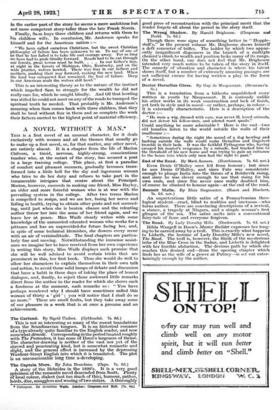A NOVEL WITHOUT A MAN.*
Tins is a first novel of an unusual character, for it deals exclusively with women and all the themes that usually go to make up a first novel, or, for that matter, any other novel, are entirely absent. It is a chapter from the life of Marion Chilvers, a timid, nervous, highly-strung, conscientious teacher who, at the outset of the story, has secured a post in a large training college. This place, at first a paradise of comfort and pleasant manners, gradually becomes trans- formed into a little hell for the shy and ingenuous woman who tries to do her duty and refuses to take part in the innumerable intrigues that centre about the Principal. Marion, however, succeeds in making one friend, Miss Bayley, an older and more forceful woman who is at war with the prevailing system in the college. After two terms Marion is compelled to resign, and we see her, losing her nerve and failing in health, trying to obtain other posts and not succeed- ing, until just when she is beaten chance and the relenting author throw her into the arms of her friend again, and we leave her at peace. Miss Waife dearly writes with some knowledge of the unmarried educated woman who works for a pittance and has an unprovided-for future facing her, and, in spite of some technical blemishes, she dowers every scene with an air of verisimilitude. The final chapters are particu- larly fine and moving. Notwithstanding the immense assist- ance we imagine her to have received from her own experience in writing this story, Miss Waife displays such promise that she will be well advised to avoid certain tricks that are prominent in this, her first book. Thus she would do well to allow her characters to explain themselves in their own talk and action, to avoid those solid lumps of debate and discussion that have a habit in these days of taking the place of honest dialogue, and, finally, to reject those awkward little remarks direct from the author to the reader for which she shows such a fondness at the moment, such remarks as : " You have perhaps wondered why I should have sometimes called this woman of thirty a girl ' ; you will notice that I shall do so no more." These are small faults, but they take away some of our pleasure in a work that is at once a promise and an achievement.


















































 Previous page
Previous page